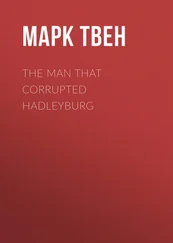Mark Twain - The Man That Corrupted Hadleyburg and Other Stories
Здесь есть возможность читать онлайн «Mark Twain - The Man That Corrupted Hadleyburg and Other Stories» весь текст электронной книги совершенно бесплатно (целиком полную версию без сокращений). В некоторых случаях можно слушать аудио, скачать через торрент в формате fb2 и присутствует краткое содержание. Год выпуска: 2004, Жанр: Классическая проза, Юмористическая проза, на английском языке. Описание произведения, (предисловие) а так же отзывы посетителей доступны на портале библиотеки ЛибКат.
- Название:The Man That Corrupted Hadleyburg and Other Stories
- Автор:
- Жанр:
- Год:2004
- ISBN:нет данных
- Рейтинг книги:4 / 5. Голосов: 1
-
Избранное:Добавить в избранное
- Отзывы:
-
Ваша оценка:
- 80
- 1
- 2
- 3
- 4
- 5
The Man That Corrupted Hadleyburg and Other Stories: краткое содержание, описание и аннотация
Предлагаем к чтению аннотацию, описание, краткое содержание или предисловие (зависит от того, что написал сам автор книги «The Man That Corrupted Hadleyburg and Other Stories»). Если вы не нашли необходимую информацию о книге — напишите в комментариях, мы постараемся отыскать её.
The Man That Corrupted Hadleyburg and Other Stories — читать онлайн бесплатно полную книгу (весь текст) целиком
Ниже представлен текст книги, разбитый по страницам. Система сохранения места последней прочитанной страницы, позволяет с удобством читать онлайн бесплатно книгу «The Man That Corrupted Hadleyburg and Other Stories», без необходимости каждый раз заново искать на чём Вы остановились. Поставьте закладку, и сможете в любой момент перейти на страницу, на которой закончили чтение.
Интервал:
Закладка:
As regards that time that George Washington told the truth, a word must be said, of course. It is the principal jewel in the crown of America, and it is but natural that we should work it for all it is worth, as Milton says in his 'Lay of the Last Minstrel.' It was a timely and judicious truth, and I should have told it myself in the circumstances. But I should have stopped there. It was a stately truth, a lofty truth—a Tower; and I think it was a mistake to go on and distract attention from its sublimity by building another Tower alongside of it fourteen times as high. I refer to his remark that he 'could not lie.' I should have fed that to the marines; or left it to Carlyle; it is just in his style. It would have taken a medal at any European fair, and would have got an honourable mention even at Chicago if it had been saved up. But let it pass; the Father of his Country was excited. I have been in those circumstances, and I recollect.
With the truth he told I have no objection to offer, as already indicated. I think it was not premeditated but an inspiration. With his fine military mind, he had probably arranged to let his brother Edward in for the cherry tree results, but by an inspiration he saw his opportunity in time and took advantage of it. By telling the truth he could astonish his father; his father would tell the neighbours; the neighbours would spread it; it would travel to all firesides; in the end it would make him President, and not only that, but First President. He was a far-seeing boy and would be likely to think of these things. Therefore, to my mind, he stands justified for what he did. But not for the other Tower; it was a mistake. Still, I don't know about that; upon reflection I think perhaps it wasn't. For indeed it is that Tower that makes the other one live. If he hadn't said 'I cannot tell a lie' there would have been no convulsion. That was the earthquake that rocked the planet. That is the kind of statement that lives for ever, and a fact barnacled to it has a good chance to share its immortality.
To sum up, on the whole I am satisfied with things the way they are. There is a prejudice against the spoken lie, but none against any other, and by examination and mathematical computation I find that the proportion of the spoken lie to the other varieties is as 1 to 22,894. Therefore the spoken lie is of no consequence, and it is not worth while to go around fussing about it and trying to make believe that it is an important matter. The silent colossal National Lie that is the support and confederate of all the tyrannies and shams and inequalities and unfairnesses that afflict the peoples—that is the one to throw bricks and sermons at. But let us be judicious and let somebody else begin.
And then—But I have wandered from my text. How did I get out of my second lie? I think I got out with honour, but I cannot be sure, for it was a long time ago and some of the details have faded out of my memory. I recollect that I was reversed and stretched across some one's knee, and that something happened, but I cannot now remember what it was. I think there was music; but it is all dim now and blurred by the lapse of time, and this may be only a senile fancy.
THE ESQUIMAUX MAIDEN'S ROMANCE
'Yes, I will tell you anything about my life that you would like to know, Mr. Twain,' she said, in her soft voice, and letting her honest eyes rest placidly upon my face, 'for it is kind and good of you to like me and care to know about me.'
She had been absently scraping blubber-grease from her cheeks with a small bone-knife and transferring it to her fur sleeve, while she watched the Aurora Borealis swing its flaming streamers out of the sky and wash the lonely snow plain and the templed icebergs with the rich hues of the prism, a spectacle of almost intolerable splendour and beauty; but now she shook off her reverie and prepared to give me the humble little history I had asked for. She settled herself comfortably on the block of ice which we were using as a sofa, and I made ready to listen.
She was a beautiful creature. I speak from the Esquimaux point of view. Others would have thought her a trifle over-plump. She was just twenty years old, and was held to be by far the most bewitching girl in her tribe. Even now, in the open air, with her cumbersome and shapeless fur coat and trousers and boots and vast hood, the beauty of her face was at least apparent; but her figure had to be taken on trust. Among all the guests who came and went, I had seen no girl at her father's hospitable trough who could be called her equal. Yet she was not spoiled. She was sweet and natural and sincere, and if she was aware that she was a belle, there was nothing about her ways to show that she possessed that knowledge.
She had been my daily comrade for a week now, and the better I knew her the better I liked her. She had been tenderly and carefully brought up, in an atmosphere of singularly rare refinement for the polar regions, for her father was the most important man of his tribe and ranked at the top of Esquimaux civilisation. I made long dog-sledge trips across the mighty ice floes with Lasca—that was her name—and found her company always pleasant and her conversation agreeable. I went fishing with her, but not in her perilous boat: I merely followed along on the ice and watched her strike her game with her fatally accurate spear. We went sealing together; several times I stood by while she and the family dug blubber from a stranded whale, and once I went part of the way when she was hunting a bear, but turned back before the finish, because at bottom I am afraid of bears.
However, she was ready to begin her story, now, and this is what she said:
'Our tribe had always been used to wander about from place to place over the frozen seas, like the other tribes, but my father got tired of that, two years ago, and built this great mansion of frozen snow-blocks—look at it; it is seven feet high and three or four times as long as any of the others—and here we have stayed ever since. He was very proud of his house, and that was reasonable, for if you have examined it with care you must have noticed how much finer and completer it is than houses usually are. But if you have not, you must, for you will find it has luxurious appointments that are quite beyond the common. For instance, in that end of it which you have called the "parlour," the raised platform for the accommodation of guests and the family at meals is the largest you have ever seen in any house—is it not so?'
'Yes, you are quite right, Lasca; it is the largest; we have nothing resembling it in even the finest houses in the United States.' This admission made her eyes sparkle with pride and pleasure. I noted that, and took my cue.
'I thought it must have surprised you,' she said. 'And another thing; it is bedded far deeper in furs than is usual; all kinds of furs—seal, sea-otter, silver-grey fox, bear, marten, sable—every kind of fur in profusion; and the same with the ice-block sleeping-benches along the walls which you call "beds." Are your platforms and sleeping-benches better provided at home?'
'Indeed, they are not, Lasca—they do not begin to be.' That pleased her again. All she was thinking of was the number of furs her aesthetic father took the trouble to keep on hand, not their value. I could have told her that those masses of rich furs constituted wealth—or would in my country—but she would not have understood that; those were not the kind of things that ranked as riches with her people. I could have told her that the clothes she had on, or the every-day clothes of the commonest person about her, were worth twelve or fifteen hundred dollars, and that I was not acquainted with anybody at home who wore twelve-hundred dollar toilets to go fishing in; but she would not have understood it, so I said nothing. She resumed:
Читать дальшеИнтервал:
Закладка:
Похожие книги на «The Man That Corrupted Hadleyburg and Other Stories»
Представляем Вашему вниманию похожие книги на «The Man That Corrupted Hadleyburg and Other Stories» списком для выбора. Мы отобрали схожую по названию и смыслу литературу в надежде предоставить читателям больше вариантов отыскать новые, интересные, ещё непрочитанные произведения.
Обсуждение, отзывы о книге «The Man That Corrupted Hadleyburg and Other Stories» и просто собственные мнения читателей. Оставьте ваши комментарии, напишите, что Вы думаете о произведении, его смысле или главных героях. Укажите что конкретно понравилось, а что нет, и почему Вы так считаете.










